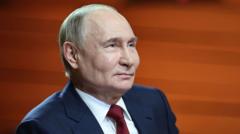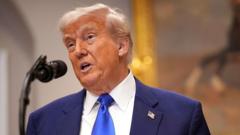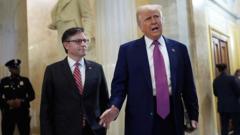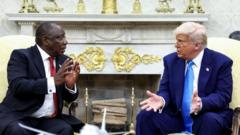In a significant shift, President Trump has announced plans to adjust existing tariffs on imported automobiles and parts, responding to pressure from car manufacturers like Ford and General Motors. This change, set to be enacted through an executive order, aims to alleviate financial burdens on these companies that have argued that hefty tariffs are leading to skyrocketing production costs and reduced profitability.
Trump Eases Tariffs for Auto Industry Amidst Economic Uncertainty

Trump Eases Tariffs for Auto Industry Amidst Economic Uncertainty
President Trump modifies tariffs, offering some relief to automakers facing rising production costs.
The forthcoming executive order will allow automakers to avoid additional tariffs on materials like steel and aluminum, a welcome change given the current climate of economic unpredictability. Under the new policy, a portion of the costs for imported components will be exempt from tariffs, although this relief is set to be gradually phased out over the next two years.
This decision has come amid warnings from General Motors, which recently adjusted its profit forecasts amid the uncertainty stemming from Trump's trade policies. The carmaker expressed concern over making reliable financial predictions under the current conditions of the auto market. G.M. CFO Paul Jacobson stated that any profit expectations are now largely speculative, highlighting the lingering effects of trade policy uncertainty on American manufacturing businesses.
As automakers navigate these turbulent waters, the adjustments to tariffs signify a contentious yet vital effort to stabilize the industry amidst escalating costs and economic challenges.
This decision has come amid warnings from General Motors, which recently adjusted its profit forecasts amid the uncertainty stemming from Trump's trade policies. The carmaker expressed concern over making reliable financial predictions under the current conditions of the auto market. G.M. CFO Paul Jacobson stated that any profit expectations are now largely speculative, highlighting the lingering effects of trade policy uncertainty on American manufacturing businesses.
As automakers navigate these turbulent waters, the adjustments to tariffs signify a contentious yet vital effort to stabilize the industry amidst escalating costs and economic challenges.






















